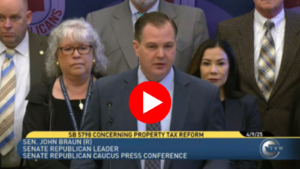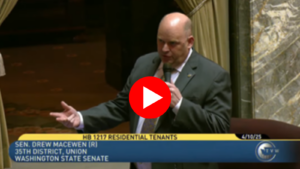WATCH: Sen. John Braun telling it like it is on property taxes and rent control
Senate Republican Leader John Braun tells us how it really is with the majority’s effort to:
- Remove the annual growth rate cap on your property taxes (SB 5798) so government can increase your property taxes by four or five times (or more) than it currently can in a single year without your approval.
- Impose price controls on rent that have proven time and again to make the availability of affordable housing worse (HB 1217).
Continuing their assault on parents’ rights and the will of the voters
Parents’ rights took another hit today when Senate Democrats passed House Bill 1296, which is another attempt to undermine the will of the voters who passed the Parents’ Rights Act last year. Not a single Republican voted for the bill.
Don’t undermine Washington voters.
While this bill no longer includes any language preventing schools from notifying parents when there is a medical emergency, it still interferes in the parent/child relationship.
HB 1296 also gives the state the power to penalize school districts who do not implement various state mandates, even if the district is small and doesn’t have the capacity to teach to a far-left social agenda imposed upon them by the Legislature.
Don’t weaponize K-12 funding.
The penalty itself involves garnishing 20% of the district’s state funding. Democrats have said recently that the state would instead use that 20% to help districts comply with the mandates. What this really means is that 20% of the district’s funding, which is constitutionally required to cover basic education, will be used to manipulate districts who are seen as willfully noncompliant.
Focus on ACADEMICS.
This is a violation of the Legislature’s paramount duty. Half our school kids can’t pass the English assessment and two-thirds can’t pass the math assessment. The state has no business playing games with a single dollar of state funding for education.
The Legislature needs to stop acting like the state school board in the sky. Recently, several Senate Democrats argued passionately for local control during a floor debate on a different bill. It’s ironic that they are pushing so hard now to take it away.
HB 1296 will return to the House of Representatives for concurrence. If the House accepts the Senate’s changes, HB 1296 will go to the governor for a signature.
READ SEN. JOHN BRAUN’S STATEMENT
A closer look: Rent control is a Trojan horse
Sen. Drew MacEwen, 35th LD, speaks on rent control during this week’s debate on the Senate floor
Everyone agrees…high rents are a serious problem across our state and something must be done. Where we disagree is on the solution.
For several years, the majority has fought to pass rent control. Limiting the amount by which your landlord can increase your rent every year sounds like a good idea to many people all along the political spectrum who are struggling.
Unfortunately, rent control a Trojan horse — it might be presented in a positive light, but it’s full of trouble.
“Let’s call it what it is — House Bill 1217 is price control, plain and simple.
And price control has a long, proven track record of failure.”
-Sen. Keith Goehner, 12th LD,
lead Senate Republican on housing
Why is rent control a bad idea?
- It reduces housing supply by discouraging developers from building new units. Landlords may decide to convert apartments into condominiums, which they can sell instead of rent. Over time, the rental market shrinks and we end up with a housing crisis far worse than we have now.
- It leads to housing deterioration because landlords will have less money to perform maintenance and improvements to their properties. Rental units fall into disrepair, resulting in a drop in housing quality.
- It encourages tenant hoarding, which is when those who live in rent-controlled units rarely move — even if their financial situation improves and someone else could benefit more from the controlled rent. This makes rent-controlled units unavailable to those with need.
- It encourages black-market practices, leading some landlords to demand illegal side payments, key money or other non-rent fees. Some tenants illegally sublet their apartments at market rates, profiting from a system designed to help low-income renters. This is what has happened in New York City.
- It discourages property investment, creating stagnation in the housing market with outdated and deteriorating properties. New investors will be discouraged from entering the rental market. If landlords sell their properties, the new owners are more likely to live in the home rather than continue to rent it out.
- It shifts costs to uncontrolled rentals where rents will be raised even higher to compensate for losses. This worsens the affordability crisis, and those in low-income units may neve be able to afford to move up.
- It creates long-term scarcity and exacerbates homelessness, which is what has happened in San Francisco and New York. In cities without rent control and high rates of new construction, RENTS GO DOWN. In Austin, Texas, the new construction of homes and apartments has caused rents to drop 13% since 2022.
Read more about the unintended consequences of rent control.
This week, Senate Democrats passed House Bill 1217 in the Senate. There were a couple of changes to the bill you should be aware of.
Originally, the bill would have capped annual rent increases at 7%, but one of the Democrats’ amendments changed it to 10%. In her speech, she admitted that all the economic data shows that a 7% cap would be “risky.” This amendment barely passed — most of the Democrats angrily opposed it.
Another Democrat amendment that passed, despite strong opposition within the Democrat caucus, exempts single-family homes that are not owned by corporate entities. If you own rental homes, this amendment would exempt you from the 10% cap.
What happens next?
HB 1217 will return to the House of Representatives where the majority is likely to refuse to accept the changes made in the Senate. This would send the bill to “conference,” which means negotiations on the bill would happen behind closed doors. If an agreement is not reached, the bill will be considered “dead.” Chances are that majority Democrats will strip out the amendments and pass the bill with the original terms.










